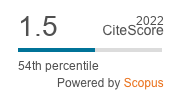The “Taste of Life” as a Mechanism of Overcoming Corruption
DOI:
https://doi.org/10.2478/cer-2018-0012Keywords:
taste of life, shadow economy, decentralization, state authority services, communityAbstract
The issue of measuring the “taste of life” is one of the main tasks in the proces of management decentralization in the state. The term “taste of life” is considered to be the degree of an individual’s satisfaction from living, functioning and carrying out his own activity in society in accordance with economic rules and orders. To solve this problem, three approaches were applied by considering the “taste of life” as a function of state authorities’ services, shadow activity and communal budget. Based on mathematical modelling and the results of expert surveys in 50 communities in the Ukrainian environment, authors made an attempt to identify the degree of state’s regularities in society and to test the constructed models. According to the results, a higher “taste” on the basis of state services caused a decrease in the likelihood of a person returning after the possibility of working and living abroad. The higher “taste” caused the smaller sensitivity to institutes of the shadow economy. At the same time, the “taste” on the basis of shadow services correlates negatively with sensitivity to the state’s official engagement in business and penalties for informal activity. So, the higher this segment, the smaller the sensitivity. The behavior of those who consider communal services and the work of the community as a basic variable is quite different. The “taste” on the basis of community services cannot explain the sensitivity to the shadow institutes and dynamics of emigration. Consequently, decentralization is a way of overcoming corruption.
Downloads
References
Bhattacharyya, D. K. (1999), On the economic rationale of estimating the hidden economy, ʽEconomic Journalʼ, Royal Economic Society, No. 109, pp. 348–359.
Google Scholar
Buehn, A., Karmann, A., Schneider, F. (2009), Shadow Economy and Do‑it‑yourself Activities: The German Case, ʽJournal of Institutional and Theoretical Economicsʼ, Mohr Siebeck GmbH & Co.KG, No. 165(4), pp. 701–722.
Google Scholar
Dell’Anno, R. (2007), The Shadow Economy in Portugal: An Analysis with the MIMIC Approach. Journal of Applied Economics, No. 10, pp. 253–277.
Google Scholar
Dell’Anno, R., Gomez‑Antonio, M., Alanon Pardo, A. (2007), Shadow Economy in three different Mediterranean Countries: France, Spain and Greece. A MIMIC Approach, ʽEmpirical Economics ʼ, Springer‑Verlag, No. 33(1), pp. 51–84.
Google Scholar
Dlouhý, M. (2014), Models of subsidy allocation among city districts, ʽPrague Economic Papersʼ, University of Economics, Prague, No. 1, pp. 108–120.
Google Scholar
Dreher, A., Schneider, F. (2009), Corruption and the Shadow Economy: An Empirical Analysis, ʽPublic Choiceʼ, Springer US, No. 144(2), pp. 215–277.
Google Scholar
Edelenbos, J., Meerkerk, I., Schenk, T. (2016), The evolution of community self‑organization in interaction with government institutions. Cross‑case insights from three countries, Erasmus University Rotterdam, Rotterdam.
Google Scholar
Feige, E. L. (1994), The Underground Economy and the Currency Enigma, Supplement to Public Finance, ʽFinances Publiquesʼ, No. 49, pp. 119–136.
Google Scholar
Frey, B. S., Pommerehne W. (1984), The Hidden Economy: State and Prospect for Measurement, ‘Review of Income and Wealth’, No. 30(1), pp. 1–23.
Google Scholar
Friedman, E., Johnson, S., Kaufmann, D., Zoido‑Lobaton, P. (2000), Dodging the Grabbing Hand: the Determinants of Unofficial Activity in 69 Countries, ʽJournal of Public Economicsʼ, No. 76, pp. 459–93.
Google Scholar
Gerxhani, K. (2003), The informal sector in developed and less‑developed countries: A literature survey. ʽPublic Choiceʼ, Springer US, No. 114(3–4), pp. 295–318.
Google Scholar
Schneider, F. (2005), Shadow Economies around the World: What Do We Really Know?, ʽEuropean Journal of Political Economyʼ, No. 21(4), pp. 598–642.
Google Scholar
Singh, A., Jain‑Chandra, S., Mohommad, A. (2012), Inclusive Growth, Institutions, and the Underground Economy, ‘IMF Working Paper’, WP/12/47, pp. 9–13.
Google Scholar
Varian, H. R. (2010), Intermediate Microeconomics. A Modern Approach, W. W. Norton & Company, New York, 806.
Google Scholar
Wan Abdul Aziz, R., Shuib, A., Nawawi, A. H., Mohd Tawil, N. (2015), Mathematical Model for Budget Planning and Execution, ʽJournal of Industrial and Intelligent Informationʼ, No. 3(2), pp. 91–96.
Google Scholar
Wolfram Math World, Central Limit Theorem, Retrieved from http://mathworld.wolfram.com/CentralLimitTheorem.html.
Google Scholar
Downloads
Published
How to Cite
Issue
Section
License

This work is licensed under a Creative Commons Attribution-NonCommercial-NoDerivatives 4.0 International License.











